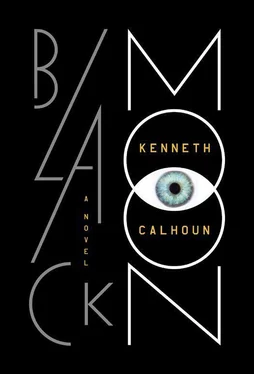“Yes, of course,” Kitov growled. “Start it already!”
“We have,” Porter said with annoyance.
Now the hard, slow work began. Lee advanced the lead in micrometer increments, listening for the firing of nerve cells, which crackled like static until Felicia helped move Kitov’s legs and arms. Then the waveform on the monitor spread across the screen like a dark stain, and the resulting firing of nerve cells was voiced with a loud, sustained creaking—a cathedral door slowly swinging open. Because they did not have the live scans of Kitov’s brain, Porter cross-checked the coordinates against a generic model of a 3-D brain—a preset from the application’s library. When they decided on an exact location, they swapped out the recording electrode for an actual pulse lead and again slowly advanced as Felicia monitored the EKG and observed Kitov’s response to Lee’s tests: extend the index finger of your right hand, tap your feet together five times, look to the left, to the right.
This went on for three hours, until by all available calculations they believed they had arrived at proper placement of the electrode.
“You ready for some downtime?” Lee asked Kitov.
“When I see Hypnos,” Kitov responded, “I will persuade him not to abandon us.”
Then, when Lee gave the nod and Porter manually triggered the sleep pulse, they watched as Kitov’s eyes dropped shut.
They checked the EKG. The heart marched on.
All three looked at one another, eyebrows raised. It seemed as though it had worked. They were removing their surgical masks when Felicia noticed the tremor in Kitov’s legs. They watched it move up his body, into his hands, into his chest, where it caused a flutter in his breathing. Then spasms hit, the body convulsing. Lee threw himself over his mentor, trying to prevent him from tearing out the pins on the stereotactic frame that caged his head. But Kitov’s body kicked and bucked, knocking over bedside machinery, the rolling tray of tools. Felicia screamed as Porter pushed her out of the way and tried to wrangle their patient’s scissoring legs. The pins tore into Kitov’s head as he twisted. Minutes later, the celebrated scientist died behind a veil of blood.
AT first they hid, staying in the lab long after the projected duration of the procedure. There were knocks at the outer door, then banging. The others. They wanted to know what was happening. When Morales, one of the security officers, used his keys to open the door, Porter yelled, “Get the fuck out!”
The officer retreated.
They sat. Felicia would not look in the direction of Kitov’s body, even though they had covered it with a blanket. She had cried, but quickly found herself too tired for emotion.
Lee could only stare into space, or down at his hands.
“If we tell them,” Felicia said, “they will lose hope.”
After no one responded, she said, “Annika I mean.”
Time passed, marked by the whirring of hard drives, the beep of monitors. The sporadic flurries of pounding on the door.
In the dead space between them, a question floated. Should they lie? If so, what would the lie be? No one said this, but Porter responded as if it had been spoken. “We say Kitov was an epileptic. He told us never and this made it unsafe.”
Felicia looked up from where she sat on the floor. “Was he?”
“Maybe,” Porter said. “It’s possible he was. How else can it be explained to anyone? All the math was right. It was fucking elephant math. Elegant.”
“It wasn’t the math,” Lee said sullenly. “An epileptic no not he.”
“Well then, what?”
“The generic model was wrong. Too young for Kitov, undeveloped, unaged. Possibly I don’t know.”
“The model was wrong,” Porter repeated sarcastically. His sleep-deprived venom surged. “Or maybe you had your girl dose him so the alpha is you now?”
Lee would not be baited. “Listen to us,” he said, slurring. “We’re too far deep to do this, just too tired. But we have to try now again. Stories won’t help.”
Porter disagreed. “You spill the truth and no one’s going sit in that chair.”
There was more pounding at the door.
Lee went to it, with Porter charging after him. He grabbed at Lee’s shoulder, but Lee shook him off. Felicia came up behind Porter, rested her hand his arm. It was her power, this touch. He looked at her, shaking his head, yet standing down.
Outside, everyone was waiting, a red-eyed, blinking mob, stooped and warped by exhaustion. Francine, now in her Smurf scrubs. Warren and the other grad students, bearded, ragged, sitting on the floor of the corridor. There were a few security men, some of the others that had come to them and were not turned away: students, university employees, Miguel from plant operations, Maritza from the neighboring institute. Some of them now three weeks without sleep. They looked past them, scanning for Kitov—for proof that there was a door in the black wall before them.
“It was not successful,” Lee said flatly. “The procedure. A mishap happened.”
THIS was a first. Relief that sleep was impossible. She feared reliving Kitov’s death in her dreams. The white, thick spittle gathering in the corners of his mouth, quickly churned into foam by the gnashing of his teeth. His eyes had rolled back when the spasm hit, so that he looked blind. So that it looked as if the inside of his head was lined with white plastic and pressure was causing the membrane to bulge out the sockets. His body jerked electrically, a marionette manipulated by an angry child. It was one thing to recall this. The horror was somewhat subdued. To dream it would be devastating all over again. To dream it is to feel it.
She had never seen someone die before, and this was a gruesome introduction to life’s departure from the body. She knew, from stories the security team had brought back from the outside, that human death littered the cities, suburbs, open fields and forests, the side of the road. Corpses scattered throughout the landscape like scarecrows blown from their stakes. Annika’s body, rising and falling on the waves. Had she actually seen this? The vision of it, real or imagined, was a quieter horror. So distant and in some ways resonating with a suggestion of release and the possibility of return. A metaphor—there in the arms of the wide blue expanse—that, yes, was like the promise of religion, not the threat. Kitov’s death bespoke a torment that persisted beyond an extinguished pulse. His posture in death, the agony of his lines, suggested that it would continue forever. That he was born into a new realm of unceasing suffering.
“That’s kind of a weird thought,” she heard Chase say from the bathroom.
“You didn’t see it,” she said.
“Is that why you won’t do it? Because you’re afraid of dying a horrible death again and again?”
“Do what?”
“You know. The thing he wants you to do, your boss—Dr. Dreamy.”
Felicia looked through the bathroom door. She could see the edge of the sink, the rim of the mirror. If she turned her head away, looking forward at the wall but concentrating—not focusing—on the margins of her field of vision, she saw his shadow on the wall. She knew Chase was talking about Lee. She knew the thing he meant was volunteering for the procedure. She felt the gravity of it, pulling at marrow in her bones, even before Lee went into the corridor and asked for someone to step forward. She dared not move, frozen with fear. Having seen what she had seen, no. She couldn’t.
“You need to do it,” Chase said. “For one thing, you promised you would see me on your birthday. If you don’t do this, you aren’t going to make it.”
She decided to ignore him.
“And if you do it, everyone will like you. And isn’t that what matters the most?”
Читать дальше












